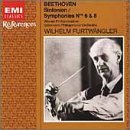| All Artists: Beethoven, Furtwangler, Vienna Phil Title: Symphonies 6 & 8 Members Wishing: 0 Total Copies: 0 Label: EMI Classics Imports Release Date: 2/27/2001 Genre: Classical Styles: Historical Periods, Classical (c.1770-1830), Modern, 20th, & 21st Century, Symphonies Number of Discs: 1 SwapaCD Credits: 1 UPC: 077776303420 |
Search - Beethoven, Furtwangler, Vienna Phil :: Symphonies 6 & 8
 | Beethoven, Furtwangler, Vienna Phil Symphonies 6 & 8 Genre: Classical
|
Larger Image |
CD Details |
CD ReviewsMy favorite version of the Pastoral 09/21/2003 (5 out of 5 stars) "This review is entirely about the Sixth Symphony which is probably one of Furtwangler's least known Beethoven recordings. This is the version of the Pastoral Symphony I grew up with. The budget LP recording I bought 30 years ago has a lot of hiss. But the music still shines through. Many will prefer Karl Bohm's recording (done with the same orchestra) because of its luscious sound. And granted, it is a very good interpretation of the Sixth. But Furtwangler was a much better conductor than Bohm and it shows, even in this recording. I like Furtwangler's pacing. Also, what sets his conducting apart from many others is his ability to give us more than the standard boring approach. As a professional reviewer once put it, "Furtwängler did not merely produce patterned sound from written directions. He created meaning far beyond the notes. He strove to communicate something ineffably profound about the human condition." EMI has cleaned up the sound. No more bad hiss. Perhaps some of the emotion is also gone. Still, I love this recording. You might want to give it a try. It may change the way you view classical music." Furtwangler was consistent in the Pastorale--this one is in Santa Fe Listener | Santa Fe, NM USA | 07/30/2006 (5 out of 5 stars) "Thanks to the resurgence of Furtwangler over the past two decades, we now have almost every recording he ever made, including dozens of live performances. In the case of the Pastorale Sym., the most prominent recordings are three: this 1952 studio account from Vienna, a wartime live performance (1844, on Music & Arts)) from Berlin, and another live Berlin performance from the year Furtwangler died (1954, on Tahra). Since all of them are now off copyright, I've given the record companies whose remastering seems the best.
Furtwangler could be more heated and urgent in his wartime recordings, but the timings for the 1944 Berlin Sixth and this one are within a few seconds of each other; only the finale in Berlin is more than 30 sec. faster. What we hear is a measured pace in the first three movements, followed by a storm and finale that are taken at speeds normal today. Nothing sounds stodgy or hidebound, however, since Furtwangler kept a flowing pulse going at all times. I won't try to put into words the special magic of Furtwangler's style. If you are attuned, he holds you entranced from first to last. The two live readings are somewhat more immediate, which is comon for Furtwangler, who was no lover of the studio. To offset that, this 1952 recording is in excellent mono sound, far better than even the best restoration of the two radio broadcasts. So for many, this is a good place to start. The Eighth is not so fortunate technically. Furtwangler died without completing a full Beethoven cycle, and EMI had to resort to a hissy shellac aircheck from Stockholm, 1948. Despite the hiss and surface gritch, the sound is quite listenable (it's like listening over a table radio), and we are rewarded with a vibrant reading that, to tell the truth, exceeds the famous Pastorale." |

 Track Listings (9) - Disc #1
Track Listings (9) - Disc #1